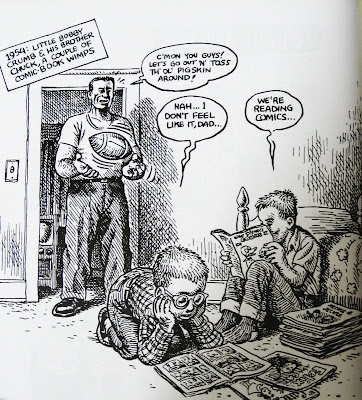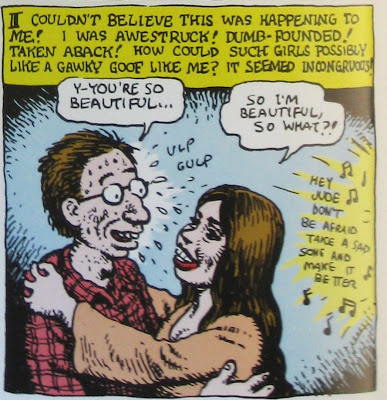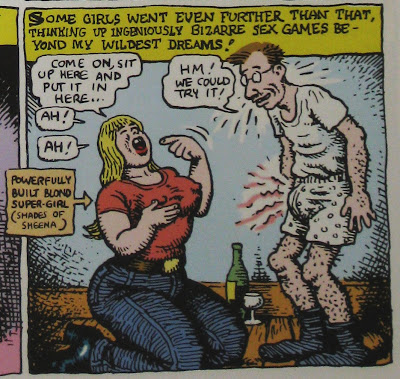During my first reading of Sodini's diaries I experienced a strong sense of uncanniness, a feeling I was unable to shake until it occurred to me that the trajectory of Sodini's life (at least until its evil climax) followed that of the Crumb brothers pretty much to a 't'. Charles, Robert, and Maxon ("Max") Crumb were first unleashed on us in the 1995 indie documentary of the same name. Though styled as an inside look at Robert's life and career as a cult comic book artist, the perverse charisma of the two supporting brothers soon hijacks the movie and transforms it into an intense exploration of male sexual frustration and the grotesque forms in which it- inevitably- unleashes itself.
Robert Crumb grew up the middle brother in a lower middle-class family of 7. While wholly predictable attempts have been made to scapegoat the brothers' post-adole
 scent dysfunction on parental abuse and the ravages of the "suburban nightmare", the truth is the Crumbs were an entirely decent, if intellectually and culturally stunted, family. By Robert's own admission the boys enjoyed a wholesome childhood consisting of Catholic mass, Disney entertainment, and games of make-believe in the backyard. Indeed the boys' later issues may well have stemmed from their refusal to leave this halcyon cocoon of safety and innocence that a prosperous, well-ordered 1950's America seemed to bestow on all its children. An early love of comic books led the boys to found their own "comix company", the name of which ("Animal Town Comics") was as touchingly sweet as the baby forest critters that filled its pages.
scent dysfunction on parental abuse and the ravages of the "suburban nightmare", the truth is the Crumbs were an entirely decent, if intellectually and culturally stunted, family. By Robert's own admission the boys enjoyed a wholesome childhood consisting of Catholic mass, Disney entertainment, and games of make-believe in the backyard. Indeed the boys' later issues may well have stemmed from their refusal to leave this halcyon cocoon of safety and innocence that a prosperous, well-ordered 1950's America seemed to bestow on all its children. An early love of comic books led the boys to found their own "comix company", the name of which ("Animal Town Comics") was as touchingly sweet as the baby forest critters that filled its pages.Yet interests that seem sweet and adorable at ages 7, 8, or 9, become frivolous and silly by ages 12, 13, or14, and downright weird by 16, 17, or 18. Charles Crumb Sr. was a man's man, a WWII veteran with 20 years of Marine Corps service under his belt. Yet the author of Training People Effectively was never able to steer his comic book-loving wi
 mpo sons toward more manly pursuits, with tragic results by the time the boys reached puberty. Charles Jr. was the first one thrown into the teen dating gauntlet, and if awkwardness and wry intellect were not handicap enough, there was the small matter of his savage persecution by the school jocks, one of whom (a certain Monsieur "Skutch") made it a point to mercilessly beat Charles whenever he so much as approached a romantic prospect. Charles retreated into himself, and by the time we encounter him 30 years later he is the clinging revenant of a life that was still-born, with never a steady job, an existence outside his parent's home, or even the most basic intimacy with a woman to its credit. Shortly before the release of Crumb Charles finally succeeds in taking his own life, ending a squalid existence hemmed in by old books, a cat-infested home, and a neighborhood long since too dangerous to escape a claustrophobic life with mother from thanks to its successful "integration" during the '70's.
mpo sons toward more manly pursuits, with tragic results by the time the boys reached puberty. Charles Jr. was the first one thrown into the teen dating gauntlet, and if awkwardness and wry intellect were not handicap enough, there was the small matter of his savage persecution by the school jocks, one of whom (a certain Monsieur "Skutch") made it a point to mercilessly beat Charles whenever he so much as approached a romantic prospect. Charles retreated into himself, and by the time we encounter him 30 years later he is the clinging revenant of a life that was still-born, with never a steady job, an existence outside his parent's home, or even the most basic intimacy with a woman to its credit. Shortly before the release of Crumb Charles finally succeeds in taking his own life, ending a squalid existence hemmed in by old books, a cat-infested home, and a neighborhood long since too dangerous to escape a claustrophobic life with mother from thanks to its successful "integration" during the '70's.Though baby brother Max manages to leave the house, his life fares little better. After going on a brief rampage of low-intensity sexual assault (highlighted by the public pantsing of a girl), Max crashes in a San Francisco transients hotel and learns to occupy his days with panhandling, sado-masochistic yoga, and the occasional foray at "outsider" art. He has no sort of romantic life either, claiming that repression of early sexual desires left him incapable of even touching a woman without going into an epileptic fit.
Robert, with all his brothers' weirdo predilections but neither of their passing good looks, somehow manages to avoid their bleak fates. Moving out of the house and to a new city, he lands an illustrator's job at a greeting cards company. Soon after he finds himself betrothed to a marriage-hungry girl from the old neighborhood who managed to track him down and corral him at the altar. Not surprisingly these doses of real life do the sensitive depressive a world of good.
But then matters take a turn for the strange. Robert and his wife hook into th
 e Cleveland hippie scene (such as it is), and by the summer of '65 are dropping acid. This proves a revelatory experience for the aspiring artist, who picks up and relocates to San Francisco and draws a series of LSD-inspired comics that are a hit with the counter-culture. An album cover assignment for Janis Joplin's group follows, and suddenly Robert is tasting the fruits of celebrity: beautiful young hippie chicks, girls that months ago he never so much as dreamed of approaching, are suddenly throwing themselves at him. He meets the carnal onrush with complete abandon, eventually leaving behind a wife and infant son, as well as a string of jilted lovers, in his wake.
e Cleveland hippie scene (such as it is), and by the summer of '65 are dropping acid. This proves a revelatory experience for the aspiring artist, who picks up and relocates to San Francisco and draws a series of LSD-inspired comics that are a hit with the counter-culture. An album cover assignment for Janis Joplin's group follows, and suddenly Robert is tasting the fruits of celebrity: beautiful young hippie chicks, girls that months ago he never so much as dreamed of approaching, are suddenly throwing themselves at him. He meets the carnal onrush with complete abandon, eventually leaving behind a wife and infant son, as well as a string of jilted lovers, in his wake.One would think such a streak of sexual prowess would be enough to balm any man's ego and forever square away his issues with the opposite sex. Yet Crumb recognized his unlikely good fortune for what it was- fortune, a fluke. The underground artist and pseudo-bohemian had not suddenly blossomed into a superior human being compared to the gangly geek who'd been a total flop with the ladies back in Philadelphia (if anything, he was now more selfish and self-centered). The fact that all it had taken to make him irresistible was celebrity
 of the most trivial kind (unlike the vast majority of Boomers Crumb had no use for the music of the 1960's- or any era, for that matter, of more recent vintage than 1939) served only to inflame old resentments and make the female sex seem even more contemptible in his eyes. Eventually Crumb's seething psychosexual hostility would express itself in the bedroom, yet to his astonishment he found this only fanned the flames of female passion. With such perverse positive
of the most trivial kind (unlike the vast majority of Boomers Crumb had no use for the music of the 1960's- or any era, for that matter, of more recent vintage than 1939) served only to inflame old resentments and make the female sex seem even more contemptible in his eyes. Eventually Crumb's seething psychosexual hostility would express itself in the bedroom, yet to his astonishment he found this only fanned the flames of female passion. With such perverse positive reinforcement, Crumb's sexual exploits became wilder and more outrageous, till by the time renewed domesticity and a censorious 2nd Wave Feminism shut down his personal sexual carnival, he had succeeded in living out his darkest fantasies. Yet in spite of all the worldly achievements, the accumulation of lovers and hangers-on and sycophants, Crumb remained irredeemably alone, unable to even return the hug of the abandoned son who took up the charcoal pencil in a desperate attempt at wining his old man's approval.
reinforcement, Crumb's sexual exploits became wilder and more outrageous, till by the time renewed domesticity and a censorious 2nd Wave Feminism shut down his personal sexual carnival, he had succeeded in living out his darkest fantasies. Yet in spite of all the worldly achievements, the accumulation of lovers and hangers-on and sycophants, Crumb remained irredeemably alone, unable to even return the hug of the abandoned son who took up the charcoal pencil in a desperate attempt at wining his old man's approval.To this gallery of life outcomes (terminal depression, asceticism, hedonistic self-isolation) we must add George Sodini's nihilistic rage, for Sodini was as much a creature of the forces that created Robert, Charles, and Maxon Crumb as any fourth brother. In his diaries it's all there. The distant father. The emasculating bully who sabotages his halting first steps at a sexual identity (in this case, Sodini's own brother!):
My dad never (not once) talked to me or asked about my life's details and tell me what he knew. He was just a useless sperm doner [sic]... Brother was actually counter-productive and would try to embarase me or discourage my efferts when persuing things, esp girls early on (teen years). Useless bully. Result is I am learning basics by trial and error in my 40s, followed by discuragement. Seems odd, but thats true. Writing all this is helping me justify my plan and to see the futility of continuing. Too embarassed to tell anyone this, at almost 50 one is expected to just know these things.Yet despite all the similarities one quickly notices a crucial difference between Sodini and the Crumbs. For despite occasional flashes of wit, it is obvious Sodini is rather mediocre in comparison to the scintillating brothers. His social opinions (where he even has them) consist of little more than self-canceling cliches (he manages to use both "liberal media" and "Amerika" in the same sentence); his insight into his own character is shaky at best; even his spelling is atrocious. Contrast this to the highly-intelligent Crumbs, who through brutal honesty AND piercing insight manage to exude an undeniable charisma. In "human biodiversity" terms I would rate Sodini's IQ at 110 or 115 at best, while the Crumbs' are comfortably in the 130 and up range. In his diaries Sodini talks about his unsatisfactory experiences with Christianity, expressing the sort of puerile blasphemies that most bright individuals grow out of (one way or the other) by early adulthood. Charles Crumb, on the other hand, uses Hegel and Kant for recreational reading.
I was always open to suggestions to what I am doing wrong, no brother or father (mine are useless) or close friend to nudge me and give it bluntly yet tactfully wtf I am doing wrong. A personal coach or someone who knows what he is doing would be perfect. Money is highly secondary for a solution.
Some were simply meant to walk a lonely path in life. I don't usually look out, but just happened to notice. Holy fuck. I have masturbated since age 13. Thanks, mum and brother (by blood alone). And dad, old man, for TOTALLY ignoring me through the years. All of you DEEPLY helped me be this way.
The fundamental injustice of Sodin's life was that he suffered all the social handicaps of the introverted, semi-autistic nerd without ever reaping the benefits of his particular strengths. With just a little more brainpower Sodini could have been admitted to Carnegie Mellon, landed a job in one of America's prestigious coastal tech corridors, and eventually found a mate in a social setting more forgiving of geeky engineer types (under-Americanized Asian females, for whom even the nerdiest white male may as well be Steve McQueen, can always do in a pinch). Even Sodini's crippling loneliness would have been assuaged by a passion for his own cutting-edge work (though this can have its own perils as well).
But unfortunately Sodini was a Milhouse, a dork who couldn't quite cut it as a nerd because of the demanding cognitive entrance requirements. And so George Sodini bumbled along, locked in a tolerable but mildly irritating career that provided a decent yet hardly glamorous lifestyle (at nearly 50 his net wealth was only $250,000), honest yet far from prestigious work (as a law firm IT flunky he would have been under the thumb of the same top-dog, alpha male jerks he'd resented since high school), and which made only occasional demands on his weekends and nights, making their yawning emptiness even more apparent.
George made a decent effort at making himself attractive to women, zapping a ratty
 -looking mustache, dressing with purpose, even putting in regular hours at the gym. In late photos one could even call him sharp-looking. But decades of solitude had taken their toll on the man, leaving him baffled and angry as to why first dates came so easily and second dates not at all. Based on his diaries I think it obvious: Sodini had become a creep, so much so that his desperation, callousness, and monomania were instantly apparent (and repellent) to any woman who bothered to scratch beneath his superficially "nice guy" exterior. Robert Crumb is a creep too, but through exceptional intelligence and self-awareness he exerts a very real charisma, and so is able to pass off self-centeredness as sensitivity and an fetishistic mind that whittles women down to nothing but their erogenous landmarks as artistic talent.
-looking mustache, dressing with purpose, even putting in regular hours at the gym. In late photos one could even call him sharp-looking. But decades of solitude had taken their toll on the man, leaving him baffled and angry as to why first dates came so easily and second dates not at all. Based on his diaries I think it obvious: Sodini had become a creep, so much so that his desperation, callousness, and monomania were instantly apparent (and repellent) to any woman who bothered to scratch beneath his superficially "nice guy" exterior. Robert Crumb is a creep too, but through exceptional intelligence and self-awareness he exerts a very real charisma, and so is able to pass off self-centeredness as sensitivity and an fetishistic mind that whittles women down to nothing but their erogenous landmarks as artistic talent.Terribly ordinary George Sodini had none of these qualities, though, and I can even now imagine him on yet another first date. He is showered, shaved, in a fresh Gap ensemble. As the entrées are cleared (the daily special never disappoints at the Macaroni Grill) and the wine begins to circulate George is feeling good, even a little cocky. The conversation is now leaving the safe, shallow waters of getting-to-know-you chitchat and entering the high seas of soul-barring disclosure. Yet the intimacies that come naturally to most people at this point (accounts of past relationships, consuming passions, even strong opinions on politics, art, or culture) is terra incognita for George, who hasn't had a girlfriend in 25 years and as a result is now consumed by THE burning question of our time- the availability and distribution of attractive young females. The fact that the overwhelming majority of humanity is oblivious to this issue merely highlights its importance to him. Who, after all, worries about the availability of breathable air or the workings of the nitrogen economy? Yet George is acutely aware that at this nexus of female flesh lie the troubles and hopes of mankind. He can't hold it in any longer. He must speak from the soul! "You know, there are over 30 million attractive, available women in the United States. Instead of bombing the Middle East..." And just like that George's social calendar opens up from here through the holidays. In Pittsburgh.